Did you know that over 70% of garage owners report an increase in their home's resale value after installing a top-grade garage epoxy floor coating? Even more eye-catching: epoxy floors resist oil stains better than nearly any traditional floor paint—saving time, money, and cleanup hassles for years to come. If you're dreaming of a brighter, cleaner, more functional garage space that’s as stylish as it is durable, you're in the right place. In this guide, we’ll reveal everything you need to know to transform your garage floor fast and make a smart investment in your home’s future.
Revolutionize Your Garage Floor: Why Garage Epoxy Floor Coatings Stand Out
Garage epoxy floor coatings aren’t just a trend—they’re a game-changer for homeowners tired of dull, stained, and hard-to-clean concrete floors. The right floor epoxy system delivers a slick, professional look while protecting against everyday garage hazards like oil leaks, chemical spills, and hot tire marks. One compelling statistic: Over 70% of homeowners say adding an epoxy floor improved their resale value, a testament to both aesthetic and functional upgrades. Plus, garage epoxy floor coatings offer superior oil resistance compared to traditional floor paint, a fact that means easier cleanup and a floor that always looks its best.
Unlike standard garage floor paint or quick-fix mats, an epoxy floor coating soaks deep into your garage floor’s concrete, forming a tough, seamless bond. The result? Dramatic durability, amazing hot tire resistance, and an easy-to-clean, slip-resistant surface that stands up to daily abuse from tools and vehicles. Homeowners also love the decorative options—ranging from classic grey and blue to sparkling metallic finishes. Whether you use your car garage to wrench, store, or simply show off your favorite ride, garage floor epoxy brings functionality and flair together in one shining package.
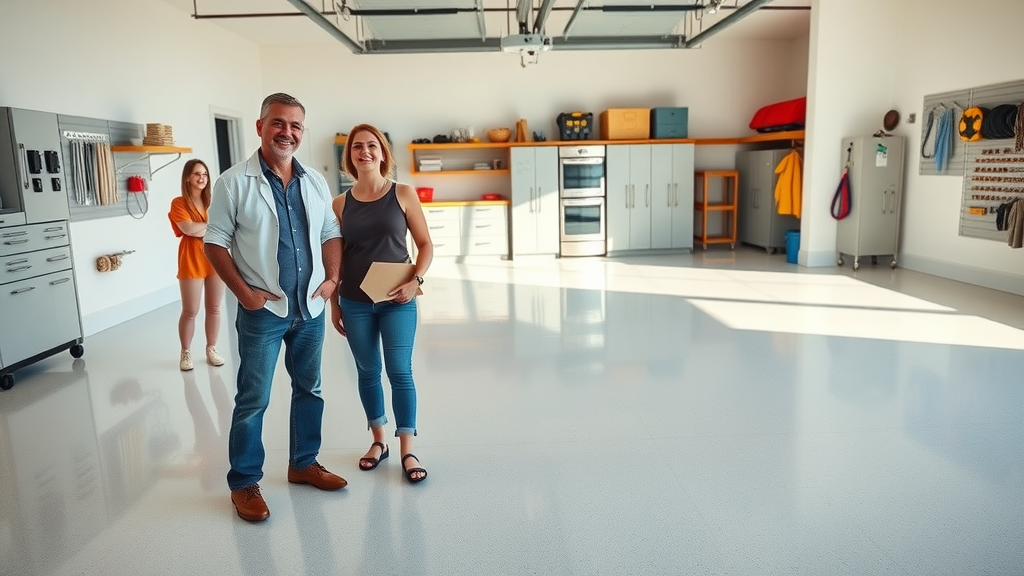
- Startling Statistic: Over 70% of garage owners say a new epoxy flooring system improved their resale value
- Unconventional Fact: Garage epoxy floor coatings resist oil stains better than most traditional floor paints
What You'll Learn About Garage Epoxy Floor Coatings
- Core features and benefits of using garage epoxy floor coatings
- Price ranges, pros and cons, and expert insights
- How garage epoxy floor coatings compare to floor paint and other floor coatings
- Answers to top questions about garage flooring
What Are Garage Epoxy Floor Coatings?
Garage epoxy floor coatings are a specialized type of floor coating designed to seal, strengthen, and beautify garage floors. These coatings combine a resin and a hardener, creating a chemical reaction that bonds tightly to concrete and results in a non-porous, rock-hard surface. Unlike a simple floor paint or quick-dry covering, an epoxy floor coating penetrates deeply and resists common threats like oil, chemicals, and hot tire pickup. Homeowners and automotive enthusiasts alike appreciate this for maintaining a clean, attractive, and easy to clean garage environment.
Many garages deal with issues like cracked concrete, unsightly stains, and tire marks. Installing a garage floor epoxy system not only solves these problems but also provides the foundation for years of reliable service. Options range from easy DIY epoxy kit installations to professional-grade full broadcast and decorative metallic epoxy finishes. No matter your needs, there’s a floor epoxy system to fit your budget, space, and style preferences. When correctly installed, these floor coatings can transform even the most outdated car garage into a high-performance zone you’ll be proud to show off.
Epoxy Floor vs. Garage Floor Paint: Key Differences
It’s easy to confuse floor paint with true epoxy, but the distinction can make all the difference in both durability and appearance. Standard garage floor paint is often latex- or acrylic-based, offering a thin protective layer and basic color update. This paint may look nice at first but is susceptible to chipping, fading, and rapid staining. In contrast, epoxy floor coatings form a much thicker, two-component shell—delivering a high-gloss, stain-resistant finish that easily withstands hot tire impact, heavy equipment, and high foot traffic.
Epoxy floor coatings are also inherently more resistant to chemicals, including gasoline, degreasers, and even battery acids, while garage floor paint breaks down and discolors quickly under these stresses. If you want a flooring system that not only looks stunning but also stands the test of time, epoxy is the superior choice every time.
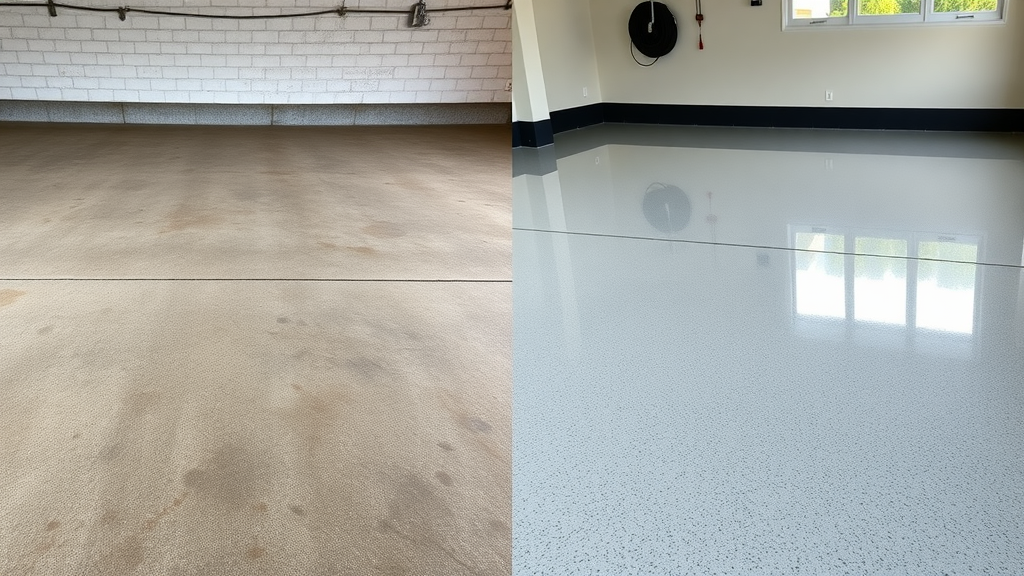
The Science Behind Epoxy Flooring
The secret to epoxy flooring’s exceptional strength and long-lasting shine lies in the chemical bond created when its two components—resin and hardener—mix. Upon application, the blend begins to cure, forming a cross-linked polymer structure that seals pores in the concrete, blocks moisture, and delivers outstanding resistance to mechanical and chemical damage. This reaction is what gives garage epoxy floor coatings their edge over standard floor paints or sealers.
Beyond its toughness, epoxy’s non-porous surface blocks oil, brake fluid, and cleaning solvents from soaking in, making it remarkably easy to clean. Premium systems may also be enhanced with color flake chips, metallic pigments, or extreme-duty textures that further boost grip and appearance. The outcome: a seamless flooring system that stays looking showroom-new with minimal effort—an advantage that traditional floor paints simply can’t match.
Types of Garage Epoxy Floor Coatings (Solids, Water-Based, Hybrid Systems)
Garage epoxy floor coatings come in several forms, each offering distinct benefits tailored to your needs. 100% solids epoxy is the gold standard for durability and thickness, offering the most chemical resistance and longest lifespan—but it often requires professional installation due to its rapid curing time. For DIY projects, water-based epoxy kits combine improved safety (lower odor, less VOC) with easier handling, though the finished surface may be slightly thinner or less glossy.
Hybrid systems, like polyaspartic blends or commercial epoxy kits, bridge performance and user-friendliness. Additionally, specialty formulations like metallic epoxy and full broadcast chip systems add dramatic colors and textures, making your car garage a true showpiece. Selecting the right type of epoxy floor coating requires evaluating the project’s scope, your comfort with installation, and your desired final look.
Top Benefits of Garage Epoxy Floor Coatings for Your Garage Floor
Choosing garage epoxy floor coatings means investing in a flooring system built to last. The most celebrated advantage is their durability and resistance: oil, brake fluid, gasoline, road salt, and even heavy dropped tools have little effect on a properly installed epoxy floor. For automotive enthusiasts or busy homeowners, this means peace of mind and reduced maintenance. In addition to robust strength, these coatings are easy to clean—all it takes is a damp mop or mild cleaner to keep your garage looking pristine, which can't be said for porous concrete or basic floor paint.
Another major plus is improved appearance, with an almost limitless array of color flake blends and designer finishes. Whether you want cool greys, eye-catching blues, or custom metallic swirls, today's garage flooring solutions deliver. Safety features are also built in: premium epoxy floor options can be formulated for anti-slip, and most resist hot tire marks—so no more sticky black patches or peeled sections where your car tires rest. This comprehensive, long-term upgrade sets epoxy apart from any other floor coating on the market.
- Durability and resistance (oil, chemicals, heavy impacts)
- Improved appearance and color flake options
- Easy maintenance and cleaning
- Hot tire resistance and anti-slip properties
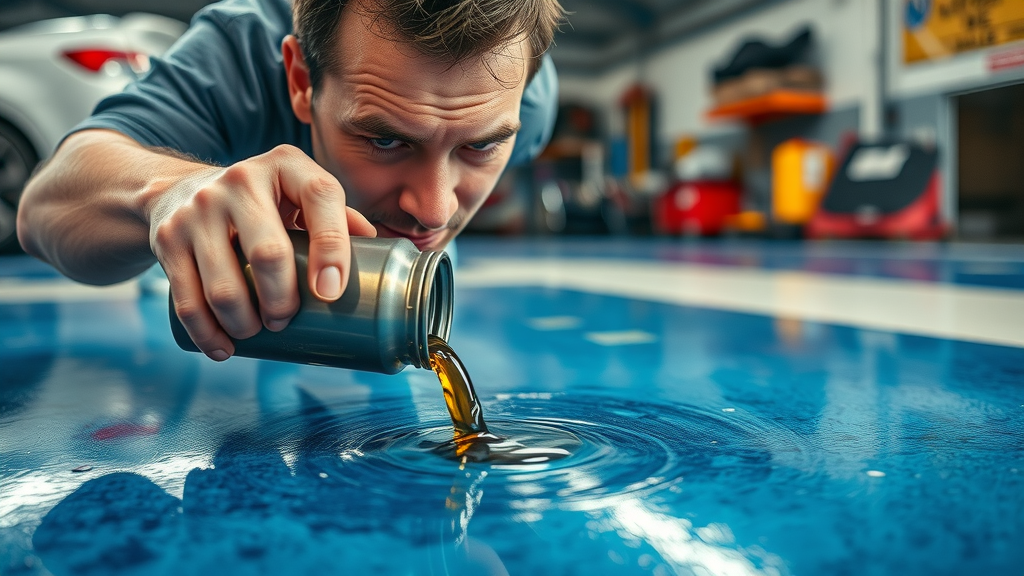
How To Choose the Right Garage Epoxy Floor Coatings
With a wide market of garage epoxy floor coatings available, picking the best solution means balancing DIY convenience, long-term durability, and style. First, assess whether you prefer the hands-on experience of using a high-quality epoxy kit, or if the complexity and finish you want means bringing in a professional. Consider your garage’s specific needs, such as exposure to sunlight (look for UV-stable products), frequency of vehicle use, risk of spills, and desired design. Review the choices for solids epoxy, metallic epoxy, and full broadcast systems, all of which offer varying looks and lifespans. With the right pick, your garage flooring will perform beautifully for years.
Pro tip: Don’t overlook your car garage layout and what activities you have planned. Heavy-duty mechanical work calls for maximum durability, while a show-car setup might prioritize brilliant metallic finishes or bold custom flakes. Pricing and ease of use will also play a big role; a top-rated epoxy kit can provide excellent value for a DIYer, but complex finishes or rough concrete may require expert service. Spending a bit more up front on the best floor epoxy for your needs is a good idea for anyone who wants truly lasting results.
Understanding Epoxy Kit Options (DIY vs. Professional)
Most homeowners face a big decision: buy a DIY epoxy kit from a local store or hire a professional for a commercial-grade system. DIY kits are typically less expensive, with the average epoxy kit containing everything you need to get started—including primer, color flake, rollers, and detailed instructions. They’re a great budget-friendly option for small or lightly used garages, often yielding solid results when you follow the package directions and don’t skip surface preparation.
However, high-traffic car garages or those seeking a flawless, showroom finish may prefer calling in pros. Professionals use industrial-strength floor coating materials, advanced equipment, and customized finishes ranging from full broadcast flakes to metallic epoxy art. If you crave maximum thickness, best-in-class chemical resistance, or unique color flake accents, a commercial kit or pro installation is your best bet—offering longer warranties and peace of mind.
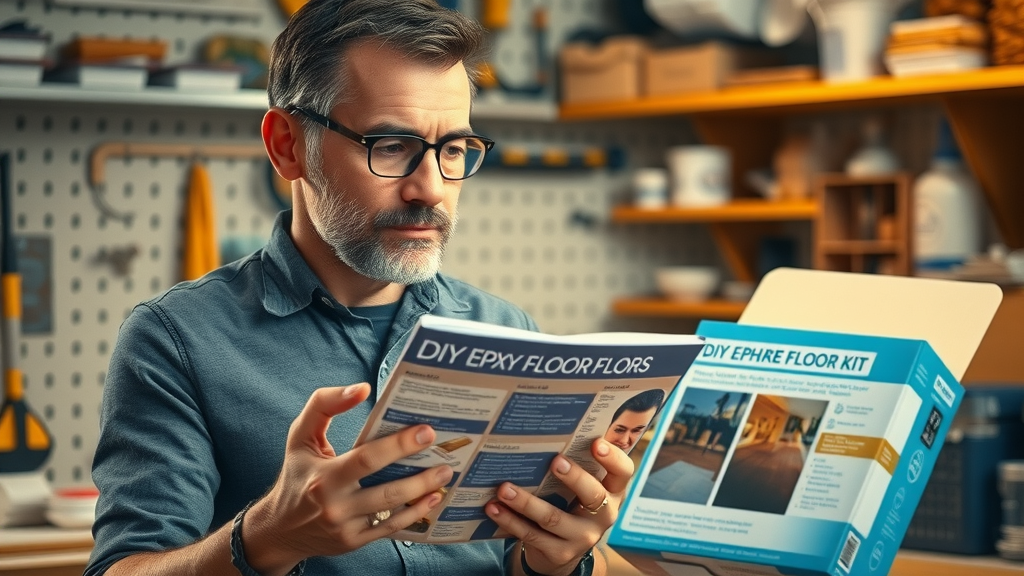
Comparing Floor Epoxy Types: Solids Epoxy, Metallic Epoxy, and Full Broadcast Systems
Understanding your options will help you select the optimal garage epoxy floor coatings for your project. Solids epoxy coatings are the gold standard for high-abuse areas, providing maximum film thickness (often over 10 mils) and exceptional hot tire or chemical resistance. By contrast, metallic epoxy coatings are as much about wow factor as utility—with swirling pigments creating dazzling, custom floors few other products can match.
For ultimate slip resistance, durability, and texture, a full broadcast system embeds dense layers of color flake chips into the floor before sealing with a clear epoxy or polyaspartic topcoat. These systems are favored by automotive shops, show-car garages, and anyone craving a truly bulletproof flooring solution. As you review options, consider both short-term installation costs and long-term performance—the right product now will deliver lower maintenance and higher satisfaction for years to come.
Matching Coatings to Your Car Garage Needs
Your car garage is unique, and so are your requirements for garage floor epoxy. Routine vehicle storage with light activity may do well with water-based or lower-solids epoxy kit solutions, which are easy to install and maintain. If you use your garage for heavy repairs, automotive work, or as a hobby workshop, invest in solids epoxy or a full broadcast system to stand up against tool drops, chemical spills, and hot tire exposure.
Don’t forget design considerations either! If your garage is part of a visible living space, or if you’re building out a dream show garage, dazzling metallic epoxy or custom color flake options may be the best fit. Always balance durability, ease of cleaning, and slip resistance against aesthetics and your ongoing maintenance preferences.
Garage Epoxy Floor Coatings Installation Guide
Installing garage epoxy floor coatings is a project that rewards attention to detail. Correct surface preparation—including deep cleaning, diamond grinding or acid etching, and priming—lays the groundwork for a seamless bond. Once ready, the epoxy is mixed, applied, broadcast with color flake if desired, and finished with a protective clear topcoat. Each step requires precision and the right conditions (temperature, humidity) for best results. The good news: the skills are accessible with good instructions, and DIYers can often save on labor while producing a truly functional and beautiful floor.
For complex or high-end installations, like metallic epoxy or commercial full broadcast systems, professional installers may use specialized machinery, industrial vacuums, and multi-step coating products that result in a premium finish. Don’t rush the curing process—proper dry time ensures long-term durability and a mirror-bright result you’ll love.
Preparation: Cleaning, Etching, and Priming Your Garage Floor
The first step to a flawless garage floor epoxy installation is thorough surface preparation. Start by sweeping and power washing the floor to remove all dirt, oil, and debris. Stubborn oil spots should be treated with a degreaser, followed by rinsing. Next, check your floor for cracks or major damage; patch these areas with an epoxy repair compound if needed. For proper bonding, the surface must be etched—commonly achieved with a mild acid wash or by using a mechanical grinder that roughens the concrete for maximum adhesion.
After cleaning and etching, allow the floor to dry completely before applying the primer coat. This step locks out residual moisture, seals pores, and improves the bond for the top floor epoxy layer. Professional-grade epoxy kits will include step-by-step guides and the necessary products, so follow the instructions closely for the best possible outcome.
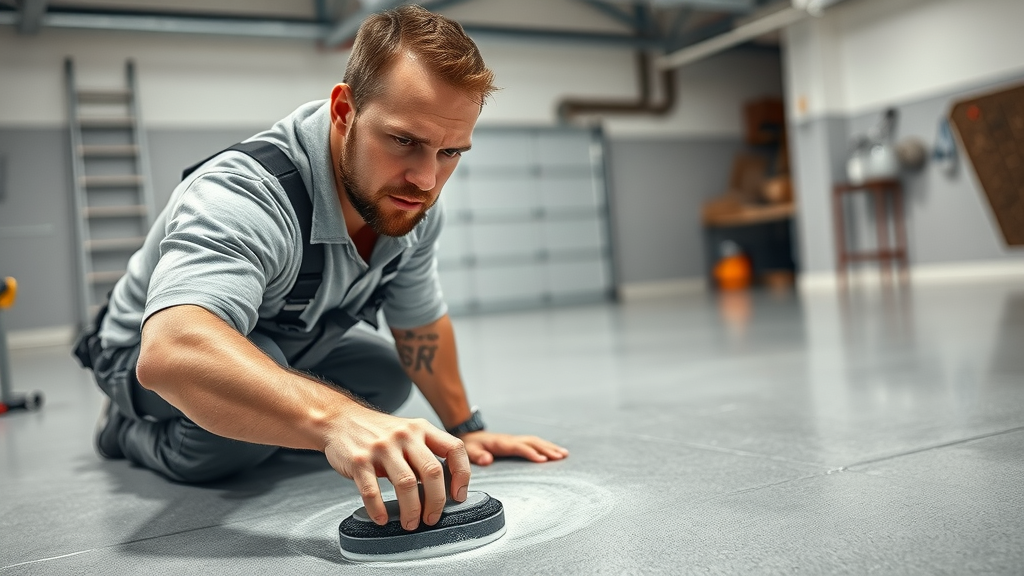
Step-by-Step Application of Garage Epoxy Floor Coatings
Begin by mixing the two-part epoxy resin and hardener thoroughly, according to the manufacturer’s instructions. Pour the mixed epoxy coating onto your prepared garage floor in small sections, working from the furthest corner toward the exit. Use a roller or squeegee to spread the material evenly, paying special attention to coverage of cracks or low spots. If using color flake, broadcast chips generously while the epoxy is still wet to ensure proper adhesion and a consistent look.
For multi-layer or premium systems, let each coat cure completely before applying additional layers (such as a clear topcoat for maximum gloss and protection). Work quickly, as some epoxy kit formulations cure in as little as 20-40 minutes. Take care to wear protective gloves and ventilate the area well for safety. After application, let the entire surface cure undisturbed before subjecting it to foot or vehicle traffic.
Curing, Dry Time, and When to Use Your Garage
Patience pays off with epoxy floors. Most garage epoxy floor coatings require a 12-24 hour initial cure before light foot traffic and a full 72 hours to handle vehicle traffic or heavy equipment. Environmental factors like temperature and humidity can influence drying times, so always follow your specific product’s guidelines. Avoid driving on or washing the new floor until fully cured—rushing this stage can compromise adhesion and reduce the coating’s resistance to chemicals and hot tire marks.
Some commercial epoxy floors or polyaspartic blends may offer faster turnaround (as little as 24 hours to drive-on time), but allowing the recommended drying and curing intervals helps ensure a mirror-bright, long-lasting finish. Once cured, you’ll enjoy years of rugged, spill-proof, and visually impressive garage flooring.
Garage Epoxy Floor Coatings Price Guide and Cost Comparison
Understanding the investment in garage epoxy floor coatings is key to smart budgeting. The cost depends on your garage size, the type and quality of epoxy used, the extent of surface prep required, and whether you choose DIY or professional installation. On average, expect to pay between $4 and $10 per square foot, inclusive of materials and labor. DIY kits often occupy the lower end, while premium epoxy floor coatings, metallic effects, or commercial installations reach the higher range. Compare this to the lifespan, maintenance savings, and home value increase—and for most homeowners, the upgrade pays for itself in a few short years.
Cheaper alternatives such as garage floor paint or basic sealers may initially cost less (sometimes as little as $1-2 per square foot), but factor in their shorter lifespan, frequent touch-ups, and inferior resistance against heavy use. For a comparison of the most popular garage flooring options, see the table below.
| Product | Average Cost per Sq. Ft. | Durability | Hot Tire Resistance | Maintenance | Appearance Options | Typical Lifespan |
|---|---|---|---|---|---|---|
| Epoxy Floor Coating (DIY) | $4 – $7 | High | Excellent | Easy to clean | Wide (Solid, Flake, Metallic) | 10–15 years |
| Epoxy Floor Coating (Pro) | $6 – $10 | Superior | Exceptional | Easy to clean | Unlimited (Designer, Hybrid) | 15–20 years |
| Garage Floor Paint | $1 – $3 | Low | Poor | Needs frequent cleaning | Basic colors | 1–2 years |
| Garage Rubber Tiles | $3 – $7 | Medium | Varies | Moderate effort | Many | 5–10 years |
Factors Influencing Price: Size, Prep, Epoxy Kit Type, Labor
Several factors impact your final installation cost. Garage size is the primary driver—larger spaces mean more material and time. Surface preparation requirements (such as crack repair or concrete grinding) can also add to expenses, especially for older or heavily stained floors. The type of epoxy or coating system you choose—water-based, solids epoxy, metallic epoxy, or full broadcast—further influences cost, with premium finishes and multi-layer systems coming at a higher price point.
Lastly, labor adds a significant share if you hire professionals; rates vary by region and the complexity of the installation. On the upside, pro installers guarantee optimal prep, perfect application, and a durable final result. For many, the extra outlay is a good idea for peace of mind and craftsmanship.
Real Customer Reviews: Garage Epoxy Floor Coatings in Action
Thousands of homeowners swear by the transformation garage epoxy floor coatings made in their homes. From hectic workshops to spotless showrooms, the reviews are full of stories of easier cleaning, enhanced home value, and just plain pride. Satisfied users repeatedly highlight how well their new floors have resisted oil, chemicals, and wear for years. Whether tackling a simple two-car garage or a high-traffic car garage, industry pros agree: the investment is worth it.
"I never realized how much garage epoxy floor coatings could transform my old car garage. The finish has held up against everything!" – Verified Homeowner
These real-world experiences echo feedback from automotive enthusiasts, busy families, and real estate pros alike: when it comes to function, beauty, and lasting return, epoxy is the ultimate floor coating for your garage.

Garage Epoxy Floor Coatings: Comparing the Competition
How do garage epoxy floor coatings compare to other garage flooring solutions? Let’s break down the most popular choices. Standard garage floor paint is easy to apply but fails to resist hot tire pickup and wears down quickly. Professionally installed epoxy floors outlast and outshine paint, though rubber garage tiles offer quick installation and some comfort underfoot—yet can shift or lift over time. Metallic epoxy and solids epoxy kits both deliver high durability, but metallics wow on appearance, while full broadcast systems win for toughness and slip resistance.
The right choice depends on your personal priorities—appearance, ease of cleaning, cost, and long-term performance. Use the side-by-side table below to see how today’s top garage floor coatings stack up.
- Garage floor paint vs. floor epoxy
- Epoxy floor coating vs. full broadcast systems
- Pros and cons of metallic epoxy and solids epoxy kits
| Flooring Option | Durability | Appearance | Maintenance | Installation |
|---|---|---|---|---|
| Epoxy Floor Coating | High | Glossy, Customizable (Color Flake, Metallic) | Easy to clean | DIY or Pro |
| Garage Floor Paint | Low | Basic Colors | Frequent re-coat needed | DIY |
| Rubber Garage Tiles | Medium | Varied | Tile replacement if damaged | DIY |
Popular Color Flake and Finish Options for Garage Epoxy Floor Coatings
Garage epoxy floor coatings aren’t just practical—they’re a chance to show off your personal style. Today’s most sought-after finishes include classic grey, crisp white, and cool blue, as well as metallic pearlescent effects and fully custom color flake patterns. These flakes not only beautify but add texture, boosting slip resistance on a glossy floor. The newest design trends feature bold contrasts, speckled full broadcast color chips, and reflective metallics that turn your garage into a true extension of your home or workplace.
Manufacturers offer preview boards and online design tools, so you can experiment with combinations that match your car, storage cabinets, or neighboring décor. Whether you want understated elegance or high-octane sports car flair, there’s a garage floor epoxy solution that fits your personality.
- Classic grey, white, and blue options
- Metallic and custom color flake designs
- Visual examples of current trends
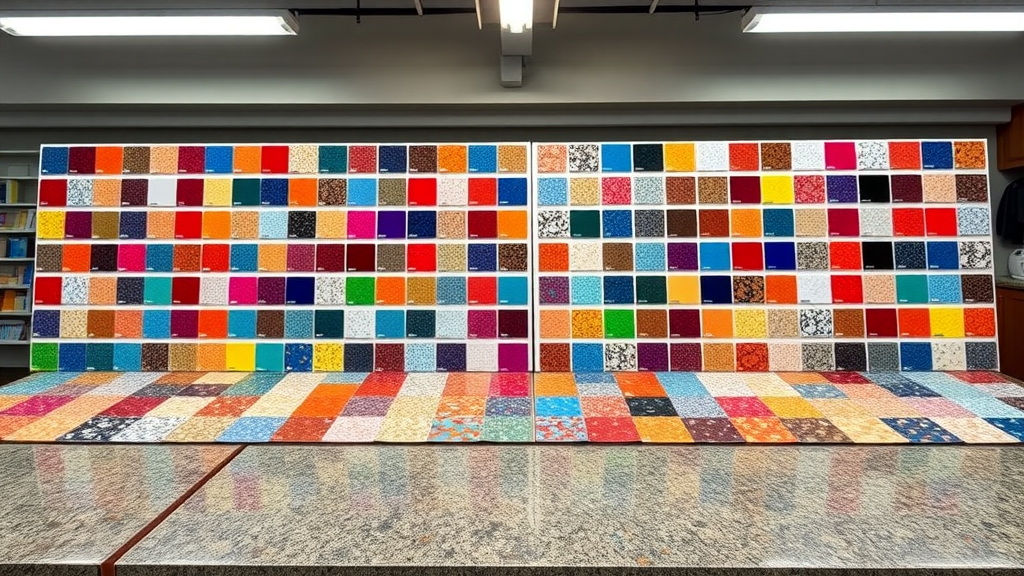
How to Maintain and Clean Garage Epoxy Floor Coatings
Garage epoxy floor coatings are as low-maintenance as they are tough. For day-to-day upkeep, simply use a soft-bristle broom or microfiber mop to remove dust and debris. Occasional mopping with a mild water-based cleaner will keep your floor easy to clean and shining. For stubborn stains or tire marks, spot clean with a gentle degreaser—harsh chemicals or abrasives aren’t needed (and are best avoided to protect your floor’s gloss).
Even after oil spills or tracked-in mud, cleanup is fast—most messes bead up on the non-porous surface, so your showroom look returns in minutes. If you ever drop chemicals or paint, a quick wipe prevents staining, something traditional floor paint can’t promise.
- Day-to-day cleaning tips
- Dealing with stains, tire marks, and chemicals
"Regular cleaning with a soft mop keeps our epoxy flooring looking showroom-new." – Professional Installer
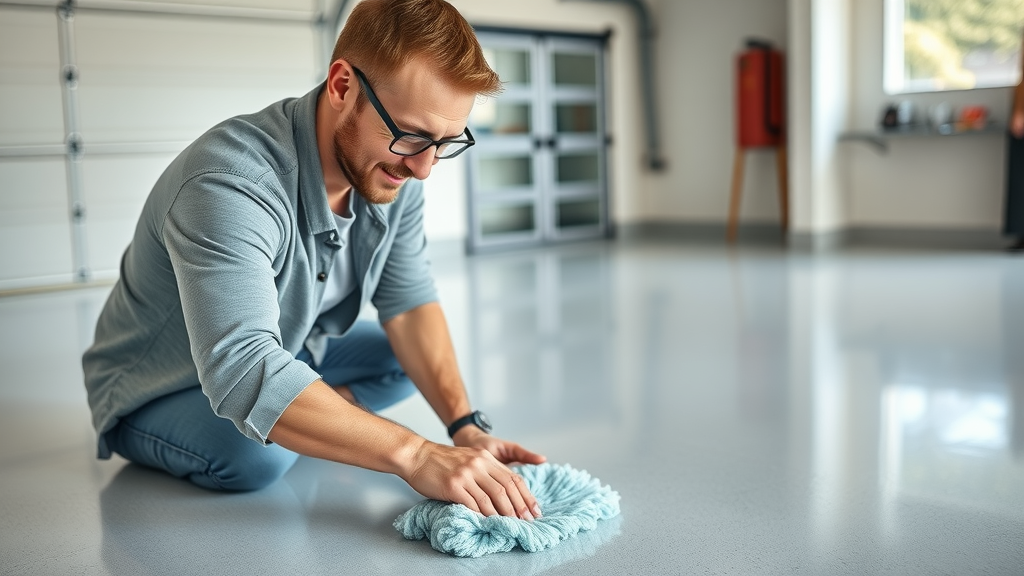
People Also Ask: Garage Epoxy Floor Coatings FAQ
What's the average cost to epoxy a garage floor?
- Averages range from $4 to $10 per square foot for garage epoxy floor coatings, depending on the garage size, floor coating type, and if you DIY or hire a pro.
What are the downsides of epoxy garage floors?
- Epoxy flooring requires proper surface prep, can be slippery when wet, and may yellow with prolonged UV exposure.
Is there anything better than epoxy for garage floors?
- Polyurea and polyaspartic coatings offer faster cure times and more UV resistance, but garage epoxy floor coatings deliver top value for many homeowners.
How long do epoxy garage floor coatings last?
- With correct prep and maintenance, garage epoxy floor coatings can last 10–20 years in most residential settings.
Key Takeaways: Why Garage Epoxy Floor Coatings Are Worth the Investment
- Garage epoxy floor coatings protect, beautify, and improve the value of your garage
- Available in a range of finishes including solids epoxy, metallic epoxy, and color flake
- With proper care, an epoxy garage floor offers years of dependable service
Garage Epoxy Floor Coatings FAQs
- Can you apply garage epoxy floor coatings yourself?
- How do epoxy floor coatings compare to garage tiles?
- How to avoid common mistakes with floor epoxy kits?
Conclusion: Transform Your Garage Floor with Garage Epoxy Floor Coatings
- Upgrade your garage space with an epoxy floor coating for years of stylish, rugged performance. Enjoy simple upkeep, impressive curb appeal, and the best long-term value for your investment.

Call us now to get your free quote!!
Enhancing your garage with an epoxy floor coating offers numerous advantages, including durability, aesthetic appeal, and ease of maintenance. For a comprehensive understanding of these benefits, consider exploring the following resources:
-
“7 Clear Benefits of Epoxying a Garage Floor” provides insights into how epoxy coatings can transform your garage space, emphasizing aspects like cost-effectiveness and resistance to damage. (ultahome.com)
-
“10 Advantages of Epoxy Floor Coating” delves into the practical benefits of epoxy flooring, such as its strength, ease of maintenance, and safety features. (shorelinepaintingct.com)
If you’re serious about upgrading your garage floor, these resources will offer valuable information to guide your decision.
 Add Row
Add Row  Add
Add 

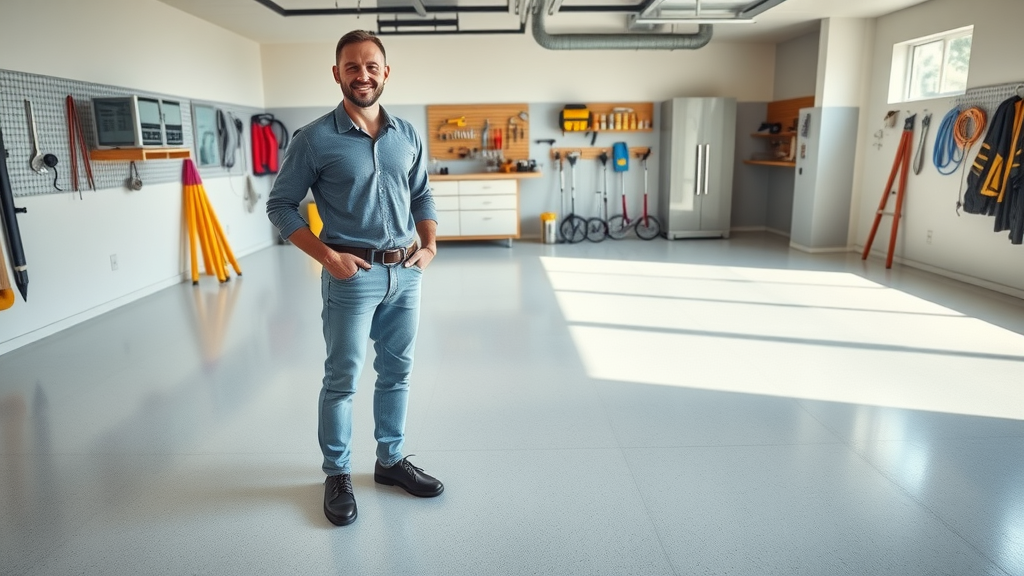
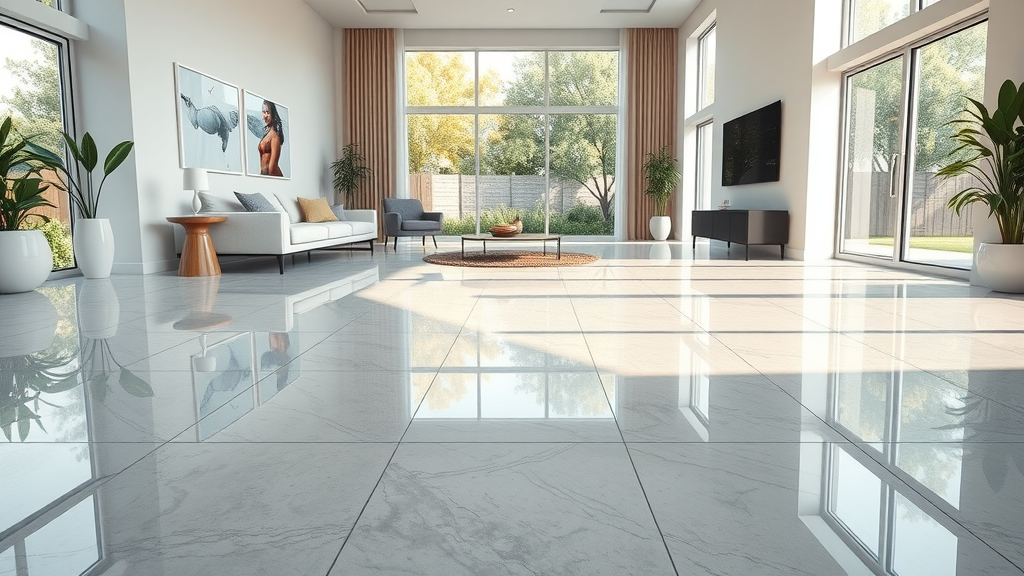
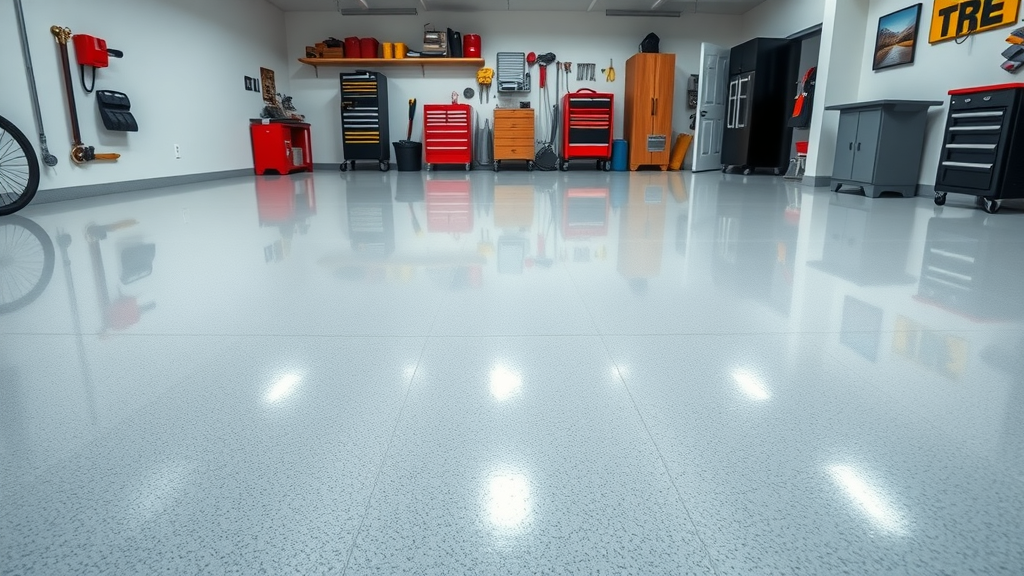
Write A Comment